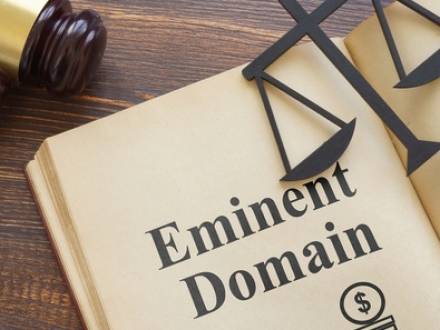Eminent Domain: Can the State of Texas Really Take Your Land?
 There is no single statistic available on the frequency of eminent domain use in Texas; however, it is a common practice. There have been recent increases in eminent domain in some regions of Texas, notably Williamson County. These instances of eminent domain are often tied to large-scale public infrastructure projects, driven by the state's growing population and economy. According to the Texas Comptroller’s database, more than 5,000 local governments and private companies have been granted the legal power to use eminent domain.
There is no single statistic available on the frequency of eminent domain use in Texas; however, it is a common practice. There have been recent increases in eminent domain in some regions of Texas, notably Williamson County. These instances of eminent domain are often tied to large-scale public infrastructure projects, driven by the state's growing population and economy. According to the Texas Comptroller’s database, more than 5,000 local governments and private companies have been granted the legal power to use eminent domain.
For Texans, land ownership is often more than just property. Land is heritage, family legacy, and, in many cases, what provides the family’s livelihood. The idea of a state, county, or private company seizing land under eminent domain to build a highway, install a pipeline, or power line can spark fierce resistance. Under the legal principle of eminent domain, the government (and, occasionally, corporations with state authority) can take private land for public use.
Eminent domain is rooted in the Fifth Amendment of the U.S. Constitution and the Texas Constitution, provided that "just compensation" is paid. You may wonder how much power you have, as a landowner, to say "no" to eminent domain. The answer to that question depends on many different factors. If your land is being threatened under eminent domain, the best step you can take is to consult a Hill County, TX real estate law attorney who can help you determine whether you can fight the process.
What is the Eminent Domain Process in Texas?
The condemning entity provides a "Landowner’s Bill of Rights" to the landowner and makes an initial offer for the property. The entity must provide the landowner with appraisal reports used to determine the offer for the property. If no agreement is reached, the entity will file a condemnation petition in court. This petition includes a description of the property, the intended public use, a list of property owners, a statement of failed negotiations, and confirmation that the Landowner’s Bill of Rights was provided to the owners.
The court will appoint three Special Commissioners to determine the amount of compensation for the property, and then a hearing will be held to determine the fair market value of the property. If the landowner is not satisfied with the amount, an objection can be filed and a trial requested in the District Court. At trial, the landowner will present his or her case, challenging the condemning entity’s valuation of the property. Either party can appeal the decision of the District Court to a higher court.
Can a Landowner Stop the Eminent Domain Process?
Generally speaking, a Texas landowner cannot stop the eminent domain process outright. The landowner can challenge the eminent domain on the grounds that the condemning entity lacks proper authority or that the taking of the land is not for legitimate public use. The primary way eminent domain is challenged is by disputing the amount of compensation offered and potentially negotiating for better terms.
In rare cases, a landowner may be able to show that the entity is taking more land than is necessary for the public project, or that, instead of a legitimate public necessity, the state is taking the land based on arbitrary reasons. Landowners facing the eminent domain process should obtain an independent professional appraisal of their property and negotiate for the best possible price.
Contact a Tarrant County, TX Real Estate Lawyer
If you have received notice that your land may be taken through eminent domain, it is easy to feel powerless. Texas law does give you some control over the situation, largely regarding how much the entity will pay for the property. When you have an experienced Hill County, TX residential real estate attorney from Cain & Kiel Law by your side, the process becomes much fairer and your rights will always be protected. Attorney Cain is a certified mediator and is also the owner of Trinity Abstract and Title in Cleburne. He has served as Cleburne’s Mayor since 2012. Call 817-645-1717 to schedule your initial attorney meeting.
We're Here When You're Ready
To set up a consultation with our attorneys and get the legal help you need, please call 817-645-1717 or fill out the form below:
The use of the Internet or this form for communication with the firm or any individual member of the firm does not establish an attorney-client relationship. Confidential or time-sensitive information should not be sent through this form.
I have read and understand the Disclaimer and Privacy Policy.

 817-645-1717
817-645-1717









